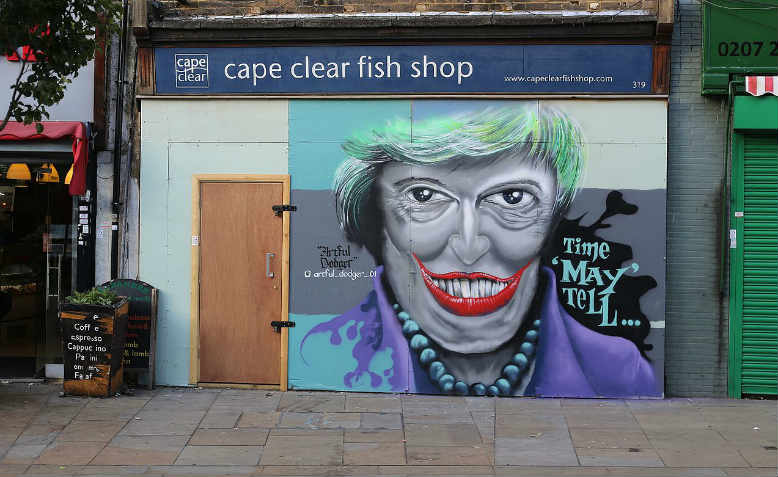 Theresa May in graffiti art, South London. Photo: Wikimedia/ Jwslubbock
Theresa May in graffiti art, South London. Photo: Wikimedia/ Jwslubbock
What are the Tories going to do about taxes, asks Lindsey German
Taxes are one of the Tory’s biggest headaches in the run-up to the election. An article in today’s Financial Times points out the dilemma: George Osborne pledged not to raise income tax, national insurance or VAT, but now the government wants the flexibility to do so, especially given economic uncertainty over Brexit.
Up to now, the Tories have been cutting back on public spending in a number of areas but there is growing opposition to this in the health service, social care, education and police and prisons. Much of what could be privatised, has been. The increasingly belligerent tones of government ministers suggest that spending on missiles and other weapons of mass destruction won’t be cut back anytime soon.
There are many Tories urging abandonment of this promise before the election. With the polls looking so good for them, the argument goes, this is the best time. That argument may prevail, in which case it is a huge political risk – particularly among the Tory demographic many of whom will be on fixed incomes, but will still pay tax and will be hit by price inflation. Six weeks may turn out to be a long time in politics.
Don’t blame the baby boomers
The connected argument, about getting rid of the triple lock on pensions, centres on how well off most pensioners are and how they should make sacrifices to help the young. The Tories are terrified of future predictions about the cost of pensions and social care. This is itself is quite astounding. Governments are meant to plan for future eventualities. There was a baby boom after the Second World War so there are more pensioners, thankfully living longer than their ancestors. They need care and financial support. Who knew?
Actually, pensions here are some of the most miserly in Europe, and many people have been swindled out of part or all of their occupational pensions. Pensions are only deferred wages, for which the recipients have paid all their working lives. The triple lock, it is true, gives pensioners cost of living rises denied to most others on benefits (or social security as we used to call it), and also denied to public sector workers like lecturers and nurses.
The argument shouldn’t be to drag pensioners down to those levels. Rather, we should be increasing payments to the unemployed and disabled, and across the public sector. It is not the fault of the old that the young pay for education, see rents going sky high and have to work ever longer before retirement. It is the fault of governments, who constantly try to divide and rule by scapegoating. So get off the pensioners’ backs.
Boris
I refrained from commenting on the unbelievably crass remarks from Boris about Jeremy Corbyn yesterday. I think it did him more harm than good, and shame on the BBC for repeating them in its news headlines.
But one thought today: why would anyone feel stable and secure with a government whose foreign secretary calls for us to follow Trump in another attack on Syria without even taking the decision to parliament? Or one whose defence secretary wants a nuclear ‘first strike’? And that both of them cynically make these comments for pure electoral advantage?

